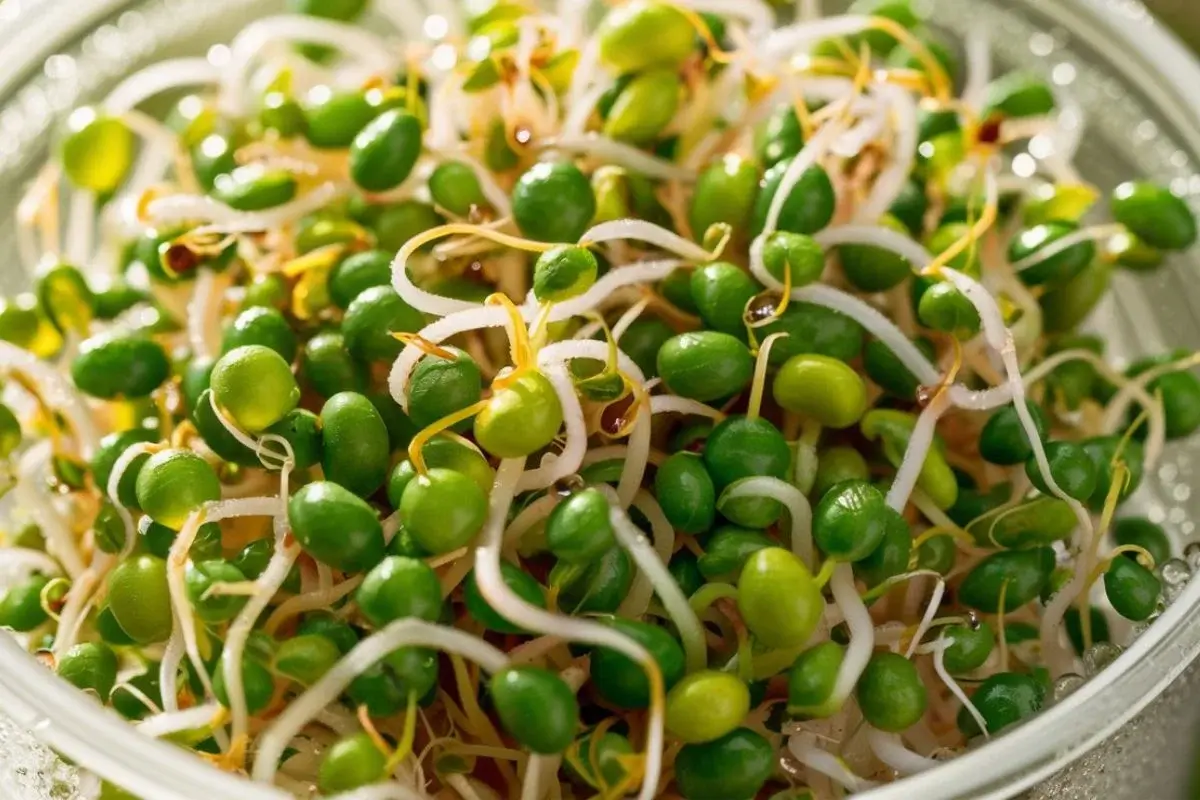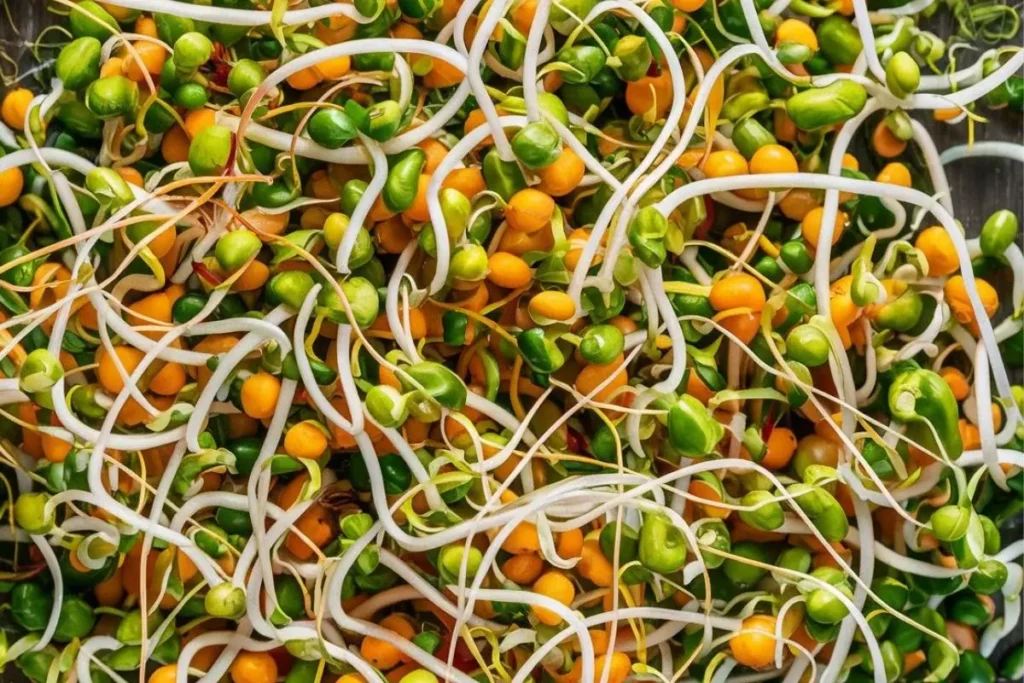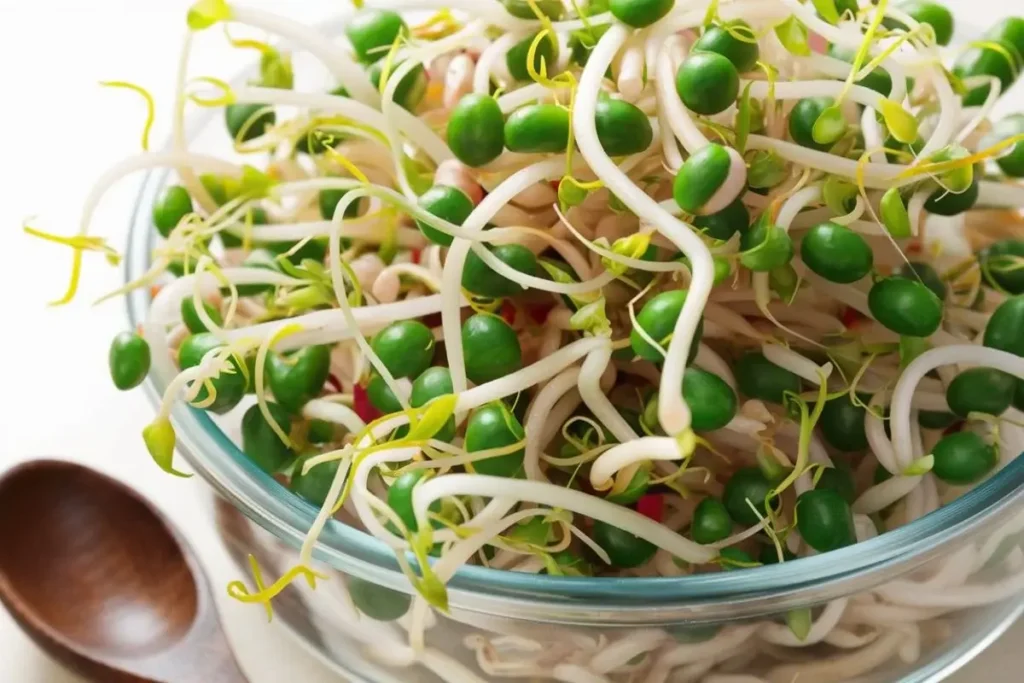In today’s health-conscious world, bean sprouts have emerged as a superfood, beloved for their crisp texture and nutritional value. But amidst their popularity, the question arises: Can you eat bean sprouts raw? This article delves deep into the health benefits and potential risks of consuming raw bean sprouts. From understanding their nutritional profile to highlighting essential safety practices, we cover all you need to know to make an informed dietary choice. Whether you’re tossing them in a salad or stirring them into a stir-fry, let’s unravel the facts about raw bean sprouts!
Understanding Bean Sprouts and Their Consumption
The Popularity of Raw Bean Sprouts in Various Cuisines
Bean sprouts, the young shoots of germinated beans, are a favorite in many culinary traditions around the globe. Their appeal lies in their crunchy texture and mild flavor, which makes them a versatile ingredient in a variety of dishes. Whether it’s adding a fresh crunch to a salad, enhancing a sandwich, or topping a bowl of pho, bean sprouts bring a delightful texture and nutritional boost to meals.
In Asia, particularly in countries like Vietnam, Korea, and Thailand, raw bean sprouts are integral to the culinary landscape. They’re often served raw alongside pho, mixed into kimchi, or included in fresh spring rolls. In the Western world, health-conscious consumers value them for their nutritional benefits, frequently using them raw in salads or as a crunchy counterpoint in wraps and sandwiches.
The global appreciation of bean sprouts underscores their role not just as a food item but as a cultural staple that bridges various dietary preferences and traditions. However, despite their popularity, consuming bean sprouts raw is often debated, primarily due to concerns over safety and the potential presence of harmful bacteria.
As we delve deeper into the benefits and safety measures associated with bean sprouts, it’s clear that while they are a nutrient-dense food, caution should be exercised by those who prefer them raw. This caution especially applies to individuals with compromised immune systems or those who are pregnant, as the risk of bacterial contamination is higher in raw sprouts compared to cooked ones.
In the next section, we’ll explore the rich nutritional profile of bean sprouts and how these nutrients contribute to health and wellness. Stay tuned as we uncover the powerhouse of vitamins and minerals tucked away in these humble sprouts!
Health Benefits of Eating Bean Sprouts Raw
Specific Nutrients Found in Bean Sprouts
Packed with vital nutrients, raw bean sprouts are an excellent addition to a healthy diet. These sprouts are exceptionally rich in vitamin C, known for its powerful antioxidant properties that help protect the body against free radical damage. This is crucial for overall health, as antioxidants play a significant role in preventing chronic diseases.
Besides vitamin C, bean sprouts are a good source of vitamin K, essential for proper blood clotting and bone health. They also provide folate, which is critical for cell growth and metabolism, making them particularly beneficial for pregnant women who need folate to support fetal development.
The mineral content in bean sprouts is equally impressive. They contain iron, which is necessary for making hemoglobin, the protein in red blood cells that carries oxygen throughout the body. Magnesium is another key mineral found in bean sprouts, supporting muscle and nerve function as well as energy production.
Fiber is another standout nutrient in bean sprouts, promoting digestive health and helping to maintain stable blood sugar levels. This makes bean sprouts particularly advantageous for individuals managing diabetes, as the fiber can assist in moderating blood glucose levels.
Health benefits of raw bean sprouts
The perks of incorporating raw bean sprouts into your diet are manifold. They improve digestion with their fiber content and help manage cholesterol levels.. The presence of antioxidants in bean sprouts enhances this effect, potentially reducing the risk of chronic diseases such as heart disease and promoting overall health.
As we continue to explore the advantages of bean sprouts, it’s clear that their inclusion in your diet can be a game-changer for your health. Next, we will tackle the risks associated with raw bean sprout consumption and how to mitigate these concerns for safe eating. Stay tuned as we peel back the layers of this nutritional powerhouse!
Risks and Safety Concerns
The Risks of Consuming Raw Bean Sprouts
While raw bean sprouts provide numerous health benefits, they also come with certain risks that cannot be ignored. The primary concern is the potential for bacterial contamination, which can lead to foodborne illnesses. Bean sprouts are particularly susceptible to bacteria such as Salmonella, E. coli, and Listeria because the warm, humid conditions required for sprouting are also ideal for bacterial growth.
Research shows that consuming raw or lightly cooked bean sprouts has been linked to food poisoning outbreaks. This risk is heightened because bacteria can be present from the seed stage and may not be completely removed through washing.
Populations at Greater Risk from Raw Sprouts
Certain populations should be particularly cautious about consuming raw bean sprouts. This group encompasses pregnant women, young children, the elderly, and those with compromised immune systems. For these groups, the consequences of foodborne illnesses can be more severe, potentially leading to serious health issues.
The risks are significant enough that health experts strongly advise these vulnerable groups to avoid raw bean sprouts altogether and opt for cooked sprouts instead. Cooking bean sprouts to a high temperature effectively kills most harmful bacteria, significantly reducing the risk of illness.
Given these concerns, it’s clear that while bean sprouts can be nutritious, consuming them safely is paramount. Next, we will explore best practices for safely enjoying bean sprouts, including tips on how to select, store, and prepare them to minimize health risks. Stay tuned for actionable advice to keep your sprouts safe and your meals enjoyable!
How to Safely Enjoy Bean Sprouts
Cooking Bean Sprouts to Reduce Risks
To mitigate the risks associated with raw bean sprouts, cooking them is a reliable safety measure. Heating bean sprouts to a high temperature—enough to make them steaming hot throughout—effectively kills the harmful bacteria that can cause foodborne illnesses. This is crucial for ensuring that the sprouts are safe to consume, especially for those in at-risk groups.
Cooking doesn’t have to mean losing all the nutritional benefits of bean sprouts. Techniques like steaming or stir-frying for a short period can retain most of their crunch and nutrients while ensuring safety. Incorporating cooked bean sprouts into dishes like stir-fries, omelets, and noodle dishes allows you to enjoy their benefits without the risks associated with eating them raw.
Best Practices for Safely Enjoying Bean Sprouts
Ensuring the safety of bean sprouts starts right from the point of purchase and extends to how you store and handle them at home. Here are some essential tips to follow:
- Selecting and Buying: Always choose fresh bean sprouts that are crisp and free from any signs of spoilage such as sliminess or a musty smell. Purchase sprouts from reputable sources to ensure their quality and proper handling.
- Storing: Refrigerate bean sprouts as soon as possible after purchase. Keep them in the crisper drawer of your refrigerator, where they can stay fresh for up to a few days. Always check for any signs of spoilage before use and discard any that do not look or smell right.
- Handling and Preparation: Wash your hands thoroughly with soap and water before and after handling bean sprouts. Rinse the sprouts under cold, running water to remove any surface dirt or potential bacteria. Even though washing does not remove all bacteria, it can reduce the risk.
By following these practices, you can help ensure that bean sprouts are a safe and enjoyable part of your meals. Next, we’ll answer some frequently asked questions about bean sprouts, providing further insights into their safe consumption.
Stay tuned as we continue to explore how to make the most of bean sprouts in your diet while keeping safety in mind!
FAQs About Eating Raw Bean Sprouts
In this section, we address some of the most common questions surrounding the consumption of raw bean sprouts. By understanding both the benefits and risks, you can make more informed decisions about including them in your diet.
Are raw bean sprouts safe to eat?
While raw bean sprouts can be eaten and offer nutritional benefits, they also pose a risk of foodborne illness due to bacteria like Salmonella and E. coli. It is particularly important for vulnerable groups such as pregnant women, young children, the elderly, and those with weakened immune systems to avoid eating raw bean sprouts. Cooking them is a safer option that significantly reduces health risks.
Do you need to cook bean sprouts?
While not a necessity for everyone, cooking bean sprouts is recommended to eliminate potential bacterial contaminants. Cooking them until they are steaming hot can help ensure that they are safe to eat, especially for those who are at higher risk of foodborne illnesses.
Can you eat bean sprouts without boiling?
Yes, you can eat bean sprouts without boiling them, but they should at least be washed under cold running water if they are to be consumed raw. However, for the highest level of safety, cooking them—whether by boiling, steaming, or stir-frying—is advisable.
Is it better to eat bean sprouts raw or cooked?
Eating sprouts cooked is generally safer because it reduces the risk of foodborne illnesses. However, if you prefer them raw for their texture and maximum nutritional benefit, ensure they are fresh and properly handled. It’s also advisable to source them from reputable suppliers who follow strict hygiene practices.
By answering these FAQs, our aim is to elucidate the safe methods for enjoying bean sprouts and equip you with the necessary information to confidently incorporate them into your diet. In the following section, we’ll conclude by helping you evaluate the pros and cons of incorporating raw bean sprouts into your meals.
Stay tuned as we conclude our comprehensive look into the world of bean sprouts!
Conclusion: Making an Informed Decision on Bean Sprouts
In concluding our exploration of raw bean sprouts consumption, it’s clear they provide significant health benefits alongside notable risks. It’s crucial not to overlook these risks. Making an informed decision about including bean sprouts in your diet involves balancing their nutritional value with safety precautions.
Weighing the Pros and Cons
The pros of consuming raw bean sprouts include their high content of vitamins, minerals, and antioxidants, which can contribute to various health benefits like improved digestion and enhanced immune function. However, you cannot dismiss the risks associated with bacterial contamination lightly. For those in good health, thorough washing and handling can reduce some risks, but cooking remains the safest method for consuming bean sprouts.
For vulnerable populations, the cons may outweigh the pros, as the potential health consequences of consuming contaminated bean sprouts can be severe. In these cases, it’s advisable to avoid raw bean sprouts altogether and opt for cooked options to ensure safety.
Final Thoughts
Bean sprouts are a versatile and nutritious addition to many meals, offering a delightful crunch and a boost of nutrients. However, consider the health risks and safety measures before eating them raw. Choose high-quality, fresh bean sprouts and follow recommended handling and cooking practices. This way, you can enjoy their benefits while minimizing the risk of foodborne illness.
Whether you eat bean sprouts raw or cooked, they can be a valuable part of a healthy diet. Just be sure to keep food safety a priority to fully enjoy their nutritional potential without compromise.
We hope this guide has given you the info you need to decide on bean sprouts for your diet. Thank you for joining us on this detailed exploration of one of nature’s modest yet mighty foods!



